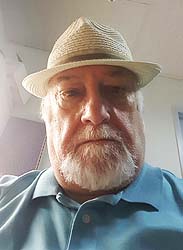 Jackie Jakubowski (1951-2020). Żegnamy przyjaciela Stowarzyszenia i Muzeum POLIN ze Szwecji
Jackie Jakubowski (1951-2020). Żegnamy przyjaciela Stowarzyszenia i Muzeum POLIN ze Szwecji
Grzegorz Gauden
Ze smutkiem przyjęliśmy wiadomość, że 25 maja 2020 r. w Sztokholmie, po długiej chorobie, w wieku 68 lat zmarł Jackie Jakubowski, który w latach 2004-2015 był przewodniczącym Szwedzkiego Komitetu Wspierania Muzeum POLIN.
 Zdjęcie: Karl Gabor
Zdjęcie: Karl Gabor
Jackie Jakubowski był cenionym szwedzkim dziennikarzem i publicystą, pisarzem i w latach 1980-2015 redaktorem naczelnym jednego z najstarszych szwedzkich magazynów kulturalnych Judisk krönika. Został uhonorowany m.in. tytułem Dziennikarz Roku 2000, doktoratem honoris causa Hebrew Union College w Los Angeles, Krzyżem Kawalerskim Orderu Zasługi RP. Wyrazem uznania Jackiego Jakubowskiego było zaproszenie go przez publiczne szwedzkie radio SR do zrobienia autorskiego programu radiowego.
Urodził się w Szczecinie 5 października 1951 r. Do 1970 r. mieszkał z ojcem w Katowicach. Licealnych marzeń o karierze aktorskiej nie zrealizował. Już w Geteborgu, do którego wyemigrowali z powodu antysemickiej nagonki, a potem obiecując umierającemu Ojcu, że zdobędzie porządny zawód. Studiował w Getoborskim Instytucie Technicznym. I jak mówił, nie przepracował w tym zawodzie ani jednego dnia.
Był drugim z kolei naczelnym Judisk krönika i stworzył pismo, które stało się ważnym głosem poruszającym tematy społeczne i cieszyło się zainteresowaniem również nieżydowskich czytelników. Teksty Jakubowskiego publikowane m.in. w dzienniku Dagens Nyheter wiele wnosiły w debaty dotyczące praw mniejszości. Był jedną z osób, która przyczyniła się do procesu sądowego i skazania aktywisty znanego z mowy nienawiści i negującego Holocaust.
Jestem w stu procentach Polakiem, w stu procentach Żydem, w stu procentach Szwedem i w stu procentach ojcem
Powyższy cytat pochodzi z wywiadu K. Andersz z J. Jakubowskim „Krótka opowieść o stuprocentowym Polaku”, Chidusz, kwiecień 2018.
Poczucie Jackiego, że jest Żydem, polskim Żydem i Polakiem przejawiało się zainteresowaniem przemianami w Polsce po 1989 r. Z ciekawością i zdumieniem zauważał księgarnie pełne książek żydowskich autorów i książek na tematy żydowskie; seminaria, festiwale kultury żydowskiej w dużych i małych miejscowościach, warszawskie dni książki żydowskiej, Midrasz i nabierające rozpędu gminy żydowskie. Z czasem zaczął bywać z rodziną na festiwalu kultury żydowskiej w Krakowie, Lublinie, Katowicach. Ale jedną z najważniejszych podróży Jackiego był jego wyjazd do Sompolna, skąd pochodziła rodzina ojca.
Dość szybko zainteresował się projektem stworzenia w Polsce muzeum poświęconego dziedzictwu polskich Żydów. Był ważną osobą dla środowiska emigrantów Marca 1968 i Polonii szwedzkiej. Było oczywiste, że został przewodniczącym Szwedzkiego Towarzystwa wspierającego Muzeum Historii Żydów Polskich (Szwedzki Komitet Wspierania Muzeum POLIN) i pozostał nim w latach 2004-2015. Chodziło o przybliżanie wiedzy o kulturze i historii polskich Żydów, ale również bliskie Jackiemu sprawy dialogu. Zwracał swoją dziennikarską uwagę na nieprawidłowe sformułowanie „polskie obozy koncentracyjne” i je poprawiał. Odnosił się także, jak mówił, do niezróżnicowanej krytyki Polski. I nie mógł pogodzić się z paradoksem, że w kraju, w którym powstaje tak wspaniałe muzeum, kolejne wydziały judaistyki i festiwale kultury żydowskiej równocześnie słychać antysemickie i nacjonalistyczne wypowiedzi.
Był jednym z podpisujących akt erekcyjny pod budowę muzeum w 2007 oraz szefem delegacji Szwedzkiego Komitetu na otwarciu muzeum w 2013 i uroczystości 70. rocznicy powstania w getcie oraz na otwarciu wystawy stałej w 2014. Rok później cieszyliśmy się wspólnie z otwarcia Miejsca Edukacji Rodzinnej „U Króla Maciusia”, którego inicjatorem i pomysłodawcą i pierwszym sponsorem jest właśnie Szwedzki Komitet.
Autorytet Jackiego Jakubowskiego odegrał niemałą rolę w nawiązywaniu kontaktów ważnych dla przyszłego muzeum ze szwedzkimi instytucjami kulturalnymi i edukacyjnymi m.in. z Forum för levande historia (Forum Żywej Historii), Szwedzkim Komitetem przeciw antysemityzmowi (SKMA), gminą żydowską, Muzeum Żydowskim. Przybywało więc w Sztokholmie wydarzeń przybliżających muzeum z udziałem m.in. prof. W. Bartoszewskiego, M. Turskiego, prof. B. Kirshenblatt-Gimblett, K. Geberta, R. Mahlamäki. Jackie przywiązywał wagę do dialogu, rozmawialiśmy więc o Zagładzie, Sąsiadach, Marcu 68, antysemityzmie w Polsce, I. Sendlerowej i Sprawiedliwych. Jedno z takich spotkań w grudniu 2019 okazało się – niestety – ostatnim, w którym uczestniczył Jackie. Była to rozmowa M. Zaremby z G. Gaudenem wokół jego książki „Lwów – kres iluzji. Opowieść o pogromie listopadowym 1918”.
Traumatyczny wyjazd Jackiego z Polski pozbawił go ojczystego języka. Wrócił do ojczyzny-polszczyzny zajmując się pracą w Towarzystwie na rzecz muzeum poświęconemu dziedzictwu polskich Żydów; naszego wspólnego domu, jak kiedyś powiedział M. Turski.
Holocaustowe doświadczenia wpłynęły na powojenne losy rodziny Jackiego. Matka i siostra bliźniaczka Jackiego w 1956 r. wyjechały do Izraela. Zobaczyli się już jako dorośli. Historia zakreśliła swoje koło. Nie mogli się i teraz pożegnać. Jackie pozostawił żonę, córkę, syna oraz wielu przyjaciół. Pożegnanie Jackiego Jakubowskiego odbyło się 28 maja w Sztokholmie na cmentarzu Norra judiska begravningsplatsen.
Przeżyliśmy wspólnie z Jackiem Jakubowskim wielką życiową przygodę przyczyniając się do powstania Muzeum Historii Żydów Polskich Polin, miejsca wspólnej pamięci… albowiem Ten jest z ojczyzny mojej…
Towarzystwo Przyjaciół Muzeum Historii Żydów Polskich POLIN – Szwedzki Komitet Wspierania Muzeum Historii Żydów Polskich POLIN
Zachęcamy do przeczytania wspomnienia Grzegorza Gaudena o Jackim Jakubowskim, które powstało na prośbę Szwedzkiego Komitetu Wspierania Muzeum POLIN, i które można przeczytać tutaj.
Podziękowania dla Szwedzkiego Komitetu Wspierania Muzeum POLIN za przygotowanie życiorysu Pana Jakubowskiego.
Zawartość publikowanych artykułów i materiałów nie reprezentuje poglądów ani opinii Reunion’68,
ani też webmastera Blogu Reunion’68, chyba ze jest to wyraźnie zaznaczone.
Twoje uwagi, linki, własne artykuły lub wiadomości prześlij na adres:
webmaster@reunion68.com




